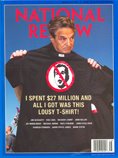
There's a part of me that likes the idea of election reform.
But, Harry Londsdale has a rather strange opinion piece in today's Oregonian.
Strange because his major examples of what need to be fixed are two losing campaigns--Mannix's and the Grande Ronde Tribes against Kulongoski. Lonsdale throws in Saxton's and Jack Roberts' much lower sums for the winners--though he doesn't mention Ted Wheeler's Multnomah County chair race where Wheeler and his family loaned/gave his campaign about $100,000.
Because Lonsdale's main examples are from losing campaigns he is forced from the usual election reform argument that money corrupts to the argument that people lose interest and don't vote when big money is involved.
On Election Day of our recent primary, The (Bend) Bulletin offered two parallel stories on its front page. One was about all of the big money affecting the different races in the state. The other was about the unusually low voter turnout.
Was it just a coincidental juxtaposition of these two stories? Or does all of the big money actually suppress voter turnout? What's your guess?
My guess is he's wrong. Let's look at the 2004 presidential election. You had big money from George Soros--maybe $27 million. And people stayed home in droves didn't they? Oops, guess not.
One problem with election reform, no matter how good it looks on the surface, is there is always a way around it. Look at the 527's in the 2004 election that basically gutted Bipartisan Campaign Reform Act of 2002. In spite of whatever damage the 527's did to campaign reform, they did allow not only George Soros but lots of little guys to band together and say things publicly and effectively that they wanted to say.
But, the worst thing with election reform is that there is no way to regulate the natural and publicly funded resources that incumbents have to get their story out. Private citizens don't have the same access for their criticism. When's the last time you saw a front page headline with any John Doe's criticism of, say, Mayor Potter? Having trouble thinking of one?
Justice Scalia had it right:
This is a sad day for the freedom of speech. Who could have imagined that the same Court which, within the past four years, has sternly disapproved of restrictions upon such inconsequential forms of expression as virtual child pornography, Ashcroft v. Free Speech Coalition, 535 U.S. 234 (2002), tobacco advertising, Lorillard Tobacco Co. v. Reilly, 533 U.S. 525 (2001), dissemination of illegally intercepted communications, Bartnicki v. Vopper, 532 U.S. 514 (2001), and sexually explicit cable programming, United States v. Playboy Entertainment Group, Inc., 529 U.S. 803 (2000), would smile with favor upon a law that cuts to the heart of what the First Amendment is meant to protect: the right to criticize the government. For that is what the most offensive provisions of this legislation are all about. We are governed by Congress, and this legislation prohibits the criticism of Members of Congress by those entities most capable of giving such criticism loud voice: national political parties and corporations, both of the commercial and the not-for-profit sort. It forbids pre-election criticism of incumbents by corporations, even not-for-profit corporations, by use of their general funds; and forbids national-party use of “soft” money to fund “issue ads” that incumbents find so offensive.
To be sure, the legislation is evenhanded: It similarly prohibits criticism of the candidates who oppose Members of Congress in their reelection bids. But as everyone knows, this is an area in which evenhandedness is not fairness. If all electioneering were evenhandedly prohibited, incumbents would have an enormous advantage. Likewise, if incumbents and challengers are limited to the same quantity of electioneering, incumbents are favored. In other words, any restriction upon a type of campaign speech that is equally available to challengers and incumbents tends to favor incumbents.
[emphasis mine]
I'd rather have Loren Parks, Ted Wheeler, Ron Wendt, the Grande Ronde Tribes (isn't it anti-pc to attack them?), and (gulp) yes, even George Soros, in the mix than limit the ability of citizens to effectively criticize their government.
Name recognition, free media publicity, "soft campaigning" as part of being in office are all a part of incumbent influence on elections that Petitions 8 and 37 don't address.

No comments:
Post a Comment